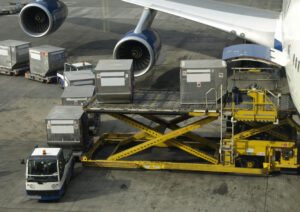Mar 04, 2024

Environmental sustainability is a prominent issue that needs to be addressed as global trade rises. Realising its moral responsibility towards safeguarding the environment and creating a better future for upcoming generations, the airline industry has pledged to be “net zero by 2050.”
Danita Waterfall-Brizzi, Principal Cargo & Logistics Consultant, Hospitio Consulting Services, asked, “What is being done to safeguard this target or tackle challenges we face to achieve them?”
Charles Wyley, EVP MEAA, Menzies Aviation, floated how they have “taken steps forward to achieve the goals of the sustainable operation, with operations becoming paperless, cargo wrapping solutions are being designed to reduce the use of plastic and ground fleets are being upgraded to be electric.”
Menzies Aviation has pledged to hit net zero by 2045, with targets of a 50% reduction by 2030, 60% by 2033 and 80% by 2040. To achieve this, Menzies Aviation will look at further electrification and the potential hydrogen presents to cut fuel consumption.
Burak Ömeroğlu, Vice President Middle East and South Asia, Turkish Cargo, explained that “Turkish Airlines has a pledged to the sustainability initiatives put forward by industry, with the carrier looking at flying aircraft via blended sustainable aviation fuel (SAF) to European destinations.”
READ: From freight to plate
With a new corporate strategy unveiled, Turkish Airlines will implement a fleet strategy of having 90% of aeroplanes consume 20% less fuel to aid them on their path to net zero. Having opened their bright facility in 2022, emphasising sustainability, Turkish Airlines is moving ground operations to be run on more environmentally friendly bio-fuels.
Vivek Chopra, Senior Director – Airfreight India & Indian Subcontinent, DB Schenker, stated, “Sustainability is one of our prominent pillars of operations, and we will be committed to net zero targets.”
SAF has been one of their flagship programmes, where 10,000 tonnes have been bought by the company in 2023, safeguarding their commitment towards sustainability. SAF is carrying out flights on specific routes with heavy load demand, with the Frankfurt-Shanghai route taking the lead.
DB Schenker relies on new-generation technology to achieve further goals, implementing artificial intelligence for their flight route optimisation model. This allows them to keep the fuel utilisation to lesser levels.
Adrien Thominet, Executive Chairman of ECS Group, expressed his views by highlighting how “our priority is adherence to a climate action plan, compliance and transparency, engaging with our people and our customers.”
As the GSSA moves towards its own and the industry’s targets, Thominet was clear ECS Group would continue to lead on and support the sustainable vision that has spread throughout the airfreight sector.
READ: Capitalising on India’s growing airfreight market
Kiran Jain, Chief Operating Officer, Noida International Airport, the upcoming airport in the northern region of India, is looking to showcase its green credentials with the country’s first completely green field airport.
The airport is being developed on the ideology of Swiss efficiency and Indian hospitality. Key pillars, such as being the first net zero airport, are at the heart of the vision that has been established, but there are challenges in smoothly delivering this goal.
The airport is committed to developing a ‘strict sustainability partnership’ programme with all stakeholders, from terminal development and operations to ground handling, hotels and other airport zones. They must create a new community that would align with their sustainable practices and greener approach.
The post Airfreight industry’s sustainable stance appeared first on AIR CARGO WEEK.
Go to Source
Author: Edward Hardy




